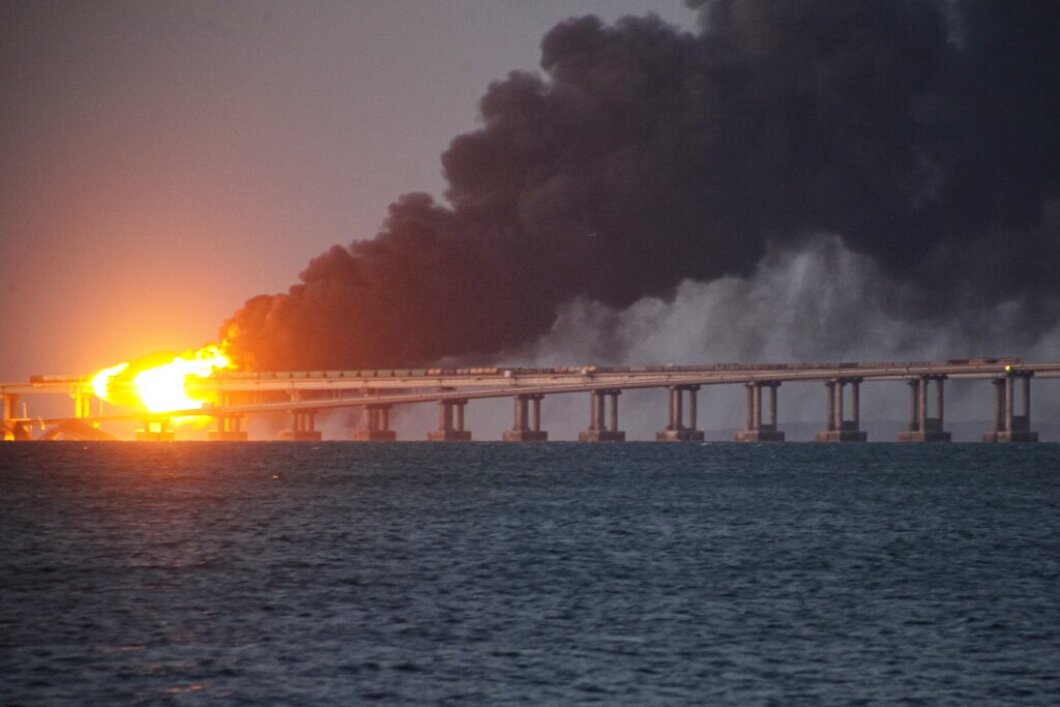
ZAPORIZHZHIA, Ukraine — Russian President Vladimir Putin on Sunday called the attack on the sprawling Kerch Bridge to Crimea “a terrorist act” carried out by Ukrainian special services and Russia’s investigative chief immediately opened a criminal terror investigation into the explosion that damaged a prominent Russian landmark.
What Russian authorities are calling a truck bomb on Saturday hit the huge bridge linking Russia with the Crimean Peninsula, which Moscow annexed eight years ago from Ukraine. Road and rail traffic on the bridge was temporarily halted, damaging an important supply route for the Kremlin’s forces and dealing a sharp blow to Russian prestige.
“There’s no doubt it was a terrorist act directed at the destruction of critically important civilian infrastructure of the Russian Federation,” Putin said in a video of a meeting Sunday with the chairman of Russia’s Investigative Committee, Alexander Bastrykin. “And the authors, perpetrators, and those who ordered it are the special services of Ukraine.”
Bastrykin said Ukrainian special services and citizens of Russia and other countries took part in the attack.

“We have already established the route of the truck,” he said, adding that it had been to Bulgaria, Georgia, Armenia, North Ossetia and Krasnodar — a region in southern Russia — among other places.
The statements followed overnight Russian missile strikes on the city of Zaporizhzhia that brought down part of a large apartment building, leaving at least a dozen people dead.
The six missiles used in Sunday’s overnight attack were launched from Russian-occupied areas of the Zaporizhzhia region, the Ukrainian air force said. The region is one of four Russia claimed as its own this month, though its capital of the same name remains under Ukrainian control.
Russia has suffered a series of setbacks nearly eight months after invading Ukraine in a campaign many thought would be short-lived. In recent weeks, Ukrainian forces have staged a counteroffensive, retaking areas in the south and east, while Moscow’s decision to call up more troops has led to protests and an exodus of tens of thousands of Russians.
Recent fighting has focused on the regions just north of Crimea, including Zaporizhzhia. Ukrainian President Volodymyr Zelenskyy lamented the latest attack in a Telegram post.
“Again, Zaporizhzhia. Again, merciless attacks on civilians, targeting residential buildings, in the middle of the night,” he wrote. At least 19 people died in Russian missile strikes on apartment buildings in the city on Thursday.
“From the one who gave this order, to everyone who carried out this order: They will answer,” he added.
Ukrainian Foreign Minister Dmytro Kuleba called the attacks on civilians a war crime and urged an international investigation.
Stunned residents watched from behind police tape as emergency crews tried to reach the upper floors of a building that took a direct hit. A chasm at least 12 meters (40-feet) wide smoldered where apartments had once stood. In an adjacent apartment building, the missile barrage blew windows and doors out of their frames in a radius of hundreds of feet. At least 20 private homes and 50 apartment buildings were damaged, city council Secretary Anatoliy Kurtev said.
Regional police reported Sunday afternoon that 13 had been killed and more than 60 wounded, at least 10 of them children.
Tetyana Lazunko, 73, and her husband, Oleksii, took shelter in the hallway of their top-floor apartment after hearing air raid sirens. The explosion shook the building and sent their possessions flying. Lazunko wept as the couple surveyed the damage to their home of nearly five decades.
“Why are they bombing us? Why?” she said.
Others called the missile attack relentless.
“There was one explosion, then another one,” 76-year-old Mucola Markovich said. In a flash, the fourth-floor apartment he shared with his wife was gone.
“When it will be rebuilt, I don’t know,” Markovich said. “I am left without an apartment at the end of my life.”
About 3 kilometers (2 miles) away in another neighborhood ravaged by a missile, three volunteers dug a shallow grave for a German shepherd killed in the strike, the dog’s leg blown away by the blast.
Abbas Gallyamov, an independent Russian political analyst and a former speechwriter for Putin, said the Russian president, who formed a committee Saturday to investigate the bridge explosion, had not responded forcefully enough to satisfy angry war hawks. The attack and response, he said, has “inspired the opposition, while the loyalists are demoralized.”
“Because once again, they see that when the authorities say that everything is going according to plan and we’re winning, that they’re lying, and it demoralizes them,” he said.
Putin personally opened the Kerch Bridge in May 2018 by driving a truck across it as a symbol of Moscow’s claims on Crimea. The bridge, the longest in Europe, is vital to sustaining Russia’s military operations in southern Ukraine.
No one has claimed responsibility for damaging it.
Traffic over the bridge was temporarily suspended after the blast, but both automobiles and trains were crossing again on Sunday. Russia also restarted a car ferry service.
Crimea is a popular vacation resort for Russians. People trying to drive to the bridge and onto the Russian mainland on Sunday encountered hours-long traffic jams.
“We were a bit unprepared for such a turn,” said one driver, Kirill Suslov, sitting in traffic. “That’s why the mood is a bit gloomy.”
The Institute for the Study of War said videos of the bridge indicated the damage from the explosion “is likely to increase friction in Russian logistics for some time” but not cripple Russia’s ability to equip its troops in Ukraine.
In other news:
— In the devastated Ukrainian city of Lyman, which was recently recaptured after a months-long Russian occupation, Ukrainian national police said authorities have exhumed the first 20 bodies from a mass burial site. Initial indications are that around 200 civilians are buried in one location and that another grave contains the bodies of fallen Ukrainian soldiers. The civilians, including children, were buried in single graves, while members of the military were buried in a 40-meter-long trench, according to police.
— The Ukrainian military said Sunday that fierce clashes were taking place around the cities of Bakhmut and Avdiivka in the eastern Donetsk region, where Russian forces have claimed some recent territorial gains. The General Staff of the Armed Forces of Ukraine did not acknowledge any loss of territory but said “the most tense situation” had been observed around those two cities.
— The head of the International Atomic Energy Agency, meanwhile, said that the Zaporizhzhia nuclear power plant, Europe’s biggest, had been reconnected to the grid after losing its last external power source early Saturday following shelling.





